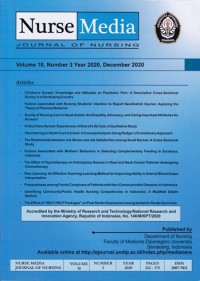
Jurnal
Preparedness among Family Caregivers of Patients with Non-Communicable Diseases in Indonesia
Background: Family caregivers spend 24 hours a day looking after and assisting patients. However, they are not always adequately prepared for all the problems they face. There is a lack of evidence exploring caregivers’ preparedness among family caregivers of patients with non-communicable diseases in Indonesia.
Purpose: This study aimed to identify caregivers’ preparedness among family caregivers of patients with non-communicable diseases.
Methods: This was a cross-sectional study conducted on 120 Indonesian family caregivers for patients with non-communicable diseases, who were selected using a purposive sampling technique. Data were collected using the Indonesian version of the Preparedness for Caregiving Scale (PCS) which had been validated before its use. The possible scores of this tool ranged from 0.00 to 4.00. The higher the score, the more prepared the family caregivers were. Data were analyzed using one way ANOVA .
Results: Family caregivers reported feeling of moderately prepared for caregiving. The score of family caregiver preparedness for patients with diabetes, cancer, and chronic kidney disease were 2.97±0.42; 2.83±0.40; 2.89±0.49, respectively with possible range from 0.00 to 4.00. There were no differences on the caregivers’ preparedness among family caregivers of patients with non-communicable diseases (p=0.387).
Conclusion: Caregivers’ preparedness is an essential element of patient care. Nurses have to be proactive in assessing each family caregiver’s preparedness to enhance the quality of life of both the family caregivers and the patients themselves, so that they can be empowered as a source of nursing care.
Availability
No copy data
Detail Information
- Series Title
-
Nurse Media Journal of Nursing, Vol. 10 No. 3 December 2020
- Call Number
-
(05) 610.5 DEP n
- Publisher
- Semarang : Department of Nursing, Faculty of Medicine Diponegoro University., 2020
- Collation
-
Hlm. 339-349
- Language
-
English
- ISBN/ISSN
-
2087-7811
- Classification
-
(05) 610.5 DEP n
- Content Type
-
-
- Media Type
-
-
- Carrier Type
-
-
- Edition
-
Vol. 10 No. 3 December 2020
- Subject(s)
- Specific Detail Info
-
-
- Statement of Responsibility
-
-
Other version/related
No other version available
File Attachment
Comments
You must be logged in to post a comment
 Computer Science, Information & General Works
Computer Science, Information & General Works  Philosophy & Psychology
Philosophy & Psychology  Religion
Religion  Social Sciences
Social Sciences  Language
Language  Pure Science
Pure Science  Applied Sciences
Applied Sciences  Art & Recreation
Art & Recreation  Literature
Literature  History & Geography
History & Geography